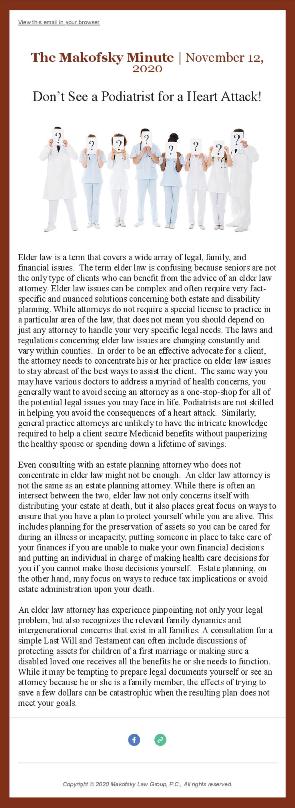Elder law is a term that covers a wide array of legal, family, and financial issues. The term elder law is confusing because seniors are not the only type of clients who can benefit from the advice of an elder law attorney. Elder law issues can be complex and often require very factspecific and nuanced solutions concerning both estate and disability
planning. While attorneys do not require a special license to practice in a particular area of the law, that does not mean you should depend on just any attorney to handle your very specific legal needs. The laws and regulations concerning elder law issues are changing constantly and vary within counties. In order to be an effective advocate for a client, the attorney needs to concentrate his or her practice on elder law issues to stay abreast of the best ways to assist the client. The same way you may have various doctors to address a myriad of health concerns, you generally want to avoid seeing an attorney as a one-stop-shop for all of the potential legal issues you may face in life. Podiatrists are not skilled in helping you avoid the consequences of a heart attack. Similarly, general practice attorneys are unlikely to have the intricate knowledge required to help a client secure Medicaid benefits without pauperizing
the healthy spouse or spending down a lifetime of savings. Even consulting with an estate planning attorney who does not concentrate in elder law might not be enough. An elder law attorney is not the same as an estate planning attorney. While there is often an intersect between the two, elder law not only concerns itself with distributing your estate at death, but it also places great focus on ways to ensure that you have a plan to protect yourself while you are alive. This includes planning for the preservation of assets so you can be cared for during an illness or incapacity, putting someone in place to take care of your finances if you are unable to make your own financial decisions and putting an individual in charge of making health care decisions for you if you cannot make those decisions yourself. Estate planning, on the other hand, may focus on ways to reduce tax implications or avoid estate administration upon your death.
An elder law attorney has experience pinpointing not only your legal problem, but also recognizes the relevant family dynamics and intergenerational concerns that exist in all families. A consultation for a simple Last Will and Testament can often include discussions of protecting assets for children of a first marriage or making sure a disabled loved one receives all the benefits he or she needs to function. While it may be tempting to prepare legal documents yourself or see an attorney because he or she is a family member, the effects of trying to save a few dollars can be catastrophic when the resulting plan does not meet your goals.



